X Inefficiency Economics
Inefficiency occurs when resources are not fully and efficiently used. How Does X-Efficiency Work.
However monopoly and trade are not the focus of this paper.
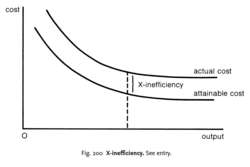
X inefficiency economics. Included in X- inefficiency are wasteful expenditures such as maintenance of excess capacity luxurious executive benefits political lobbying seeking protection and favourable regulations and litigation. The answer is that some entrepreneurs may have such goals as easier work time corporate growth avoidance of business risks or giving some jobs to their relatives that aren. The output that is produced as a result of the inefficient use of resources is therefore less than what is possible if the resources are fully and efficiently used.
Market theory predicts that all firms will be x-efficient under perfect competition because competitors would drive x-inefficient firms out of business over. Useful video for those studying A-level Economics aqa Ocr or Edexcel or other intern. Why does X-inefficiency occurs if it reduces firms revenue.
Efficiencymeasured via the concept of x-efficiency which is defined as the degree to which a group of inputs achieves the maximal level of outputs possible with those inputs. Revision video to explain the concept of X-inefficiency in Economics. It is shown as cost above the estimated cost frontier and output below the estimated output frontier.
Some common examples of x-inefficient behaviour include businesses happy with satisficing profits permitting a degree of organisational slack and rising average. For example a state owned firm may be more concerned about the political implications of making people redundant than getting rid of surplus workers. Inefficiency means that the current output is lower than the potential output.
In economic models involving international trade X is usually chosen to represent exports and M to represent. Typically we use the term x-inefficiency when analysing costs in imperfectly competitive markets such as monopoly duopoly and oligopoly. X-inefficiency happens when a lack of effective competition in an industry means that average costs are higher than they would be if the market was more contestable.
X-inefficiency refers to the degree of efficiency maintained by firms under conditions of imperfect competition. Economics - basics QUIZ 5 MCQS On Microeconomics-2. In this short revision topic video we look at the concept of X-inefficiencyTypically we use the term x-inefficiency when analysing costs in imperfectly co.
X-Innefficiency is the failure of firm to produce any specific output at lowest possible average total cost. This term was first introduced by Harvey Leibenstein in his Allocative efficiency vs X-efficiency 1966. X-inefficiency is an inefficiency within the firm.
X-inefficiency happens when a lack of effective real competition in a market or industry means that average costs are higher than they would be with competition. This translates into both cost minimisation and production maximisation failure and hence implies a loss of efficiency. Allocative inefficiency deals with either monopoly or international trade.
It is the divergence of a firms observed behavior in practice influenced by a lack of competitive pressure from efficient behavior assumed or implied by economic theory. Homo x-inefficicus or as Mises said homo agens will place. QUIZ 5 MCQS On Microeconomics-2.
Our primary concern is with the broader issue of allocative efficiency versus an initially undefined type of efficiency that we shall refer to as X-efficiency The magnitude and nature of this type of efficiency is. X-inefficiency is known as the result of inputs not producing their maximum output as a consequence of an X factor. Economist Harvey Leibenstein a Harvard professor who studied the psychological aspects of economics first used the term.
X-efficiency describes a companys inability to get the maximum output for its inputs due to a lack of competitive pressure. Subsequently question is what does X mean in economics. X-inefficiency happens when a lack of effective real competition in a market or industry means that average costs are higher than they would be with competition.
Other articles where X-efficiency is discussed. More convenient to speak of X-inefficiency where this means less than full efficiency It seems appro-priate therefore that my work on X-inefficiency began as a consequence of the availability of under-HARVEY LEIBENSTEIN is Andalot Professor of Economics Harvard University. The lack of incentives or competitive pressures may lead monopolistic firms to neglect minimizing unit costs of production ie to tolerate X-inefficiency phrase coined by H.
Homo economicus will place the firm on their frontiers. Employing workers who arent necessary for the productive process. - X - X.
X inefficiency occurs when AThe price is greater than the average cost BCosts are higher than they could be due to a lack of competitive pressure.
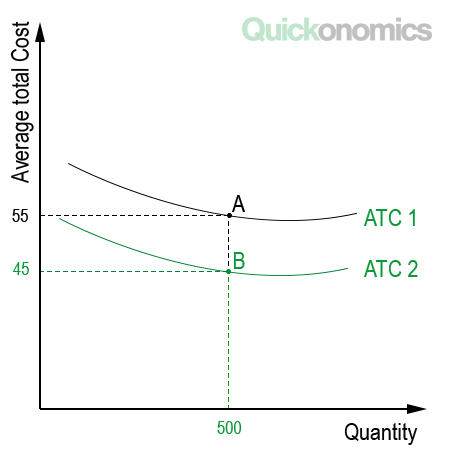
Five Types Of Economic Efficiency Quickonomics

Pdf Critical View On Leibenstein S X Efficiency Theory Semantic Scholar

What Is X Efficiency Definition And Meaning Market Business News

Efficiency Types Economics Online Economics Online

Efficiency Types Economics Online Economics Online
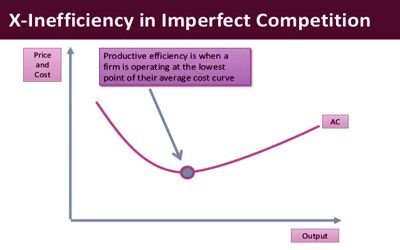
X Inefficiency Degree Of Efficiency Assignment Point

X Inefficiency Financial Definition Of X Inefficiency

Efficiency Types Economics Online Economics Online

X Inefficiency In Monopoly Download Scientific Diagram

X Inefficiency In Monopoly Download Scientific Diagram

Understanding X Inefficiency Youtube
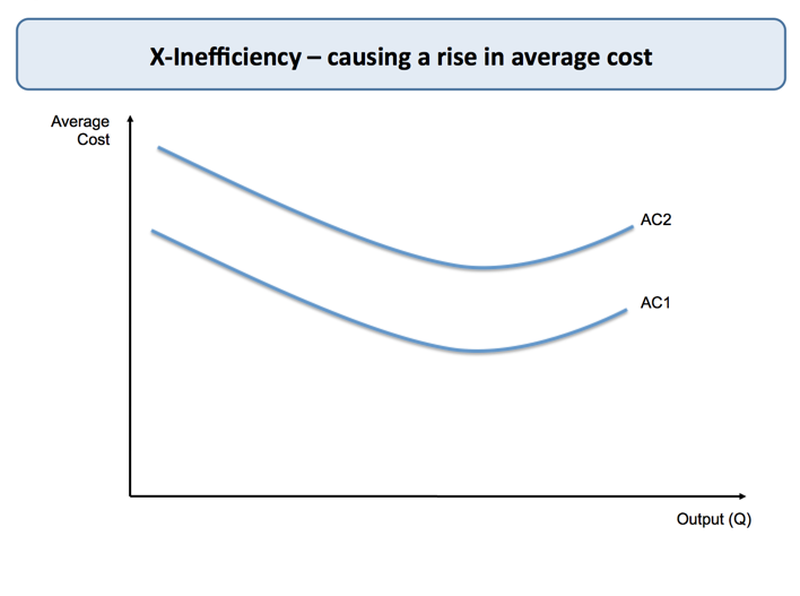

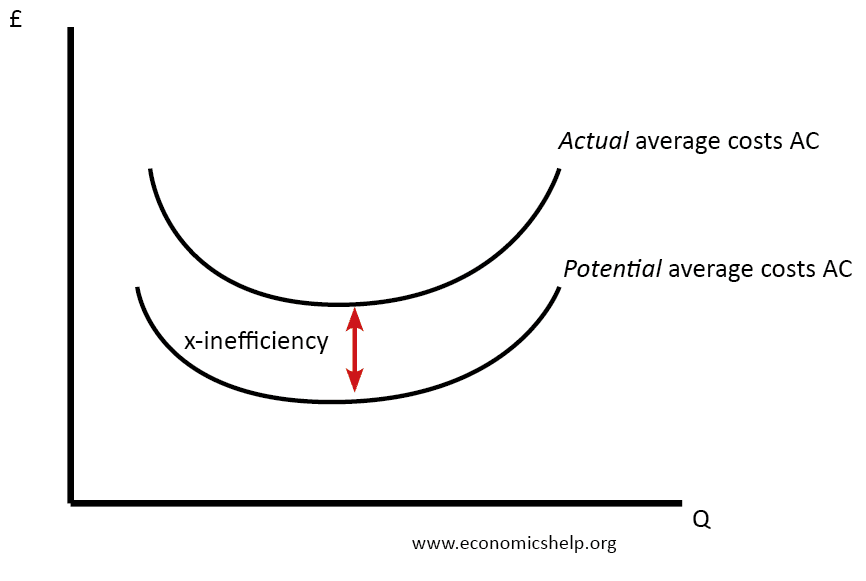
Posting Komentar untuk "X Inefficiency Economics"